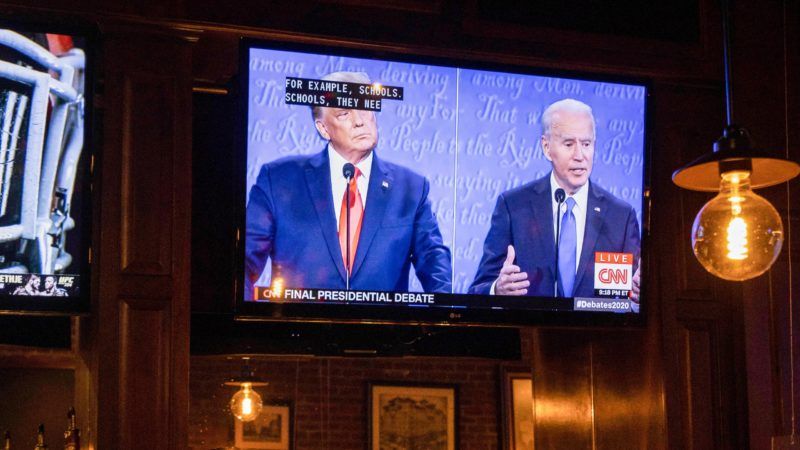Is Biden's Oil Transition Debate Claim Really a 'Big Statement'?
Not so much

During the climate change segment of the presidential candidate debate last night, President Donald Trump goaded his opponent former Vice-President Joe Biden with the question,"Would you close down the oil industry?" Biden responded, "I would transition from the oil industry. Yes." Trump immediately interrupted crowing, "That's a big statement." Biden agreed that it was a "big statement," and added, "Well if you let me finish the statement, because it has to be replaced by renewable energy over time, over time, and I'd stopped giving to the oil industry, I'd stop giving them federal subsidies."
Trump retorted, "In terms of business, it's the biggest statement." Why? "Because basically what he's saying that he's going to destroy the oil industry. Will you remember that Texas? Will you remember that Pennsylvania, Oklahoma. Ohio?," asked the president.
When given a chance by the moderator to respond, Biden declared, "He takes everything out of context, but the point is, look, we have to move toward net zero emissions. The first place to do that by the year 2035 is in energy production, by 2050 totally."
In this case, Biden was essentially summarizing his plan to respond to man-made climate change by phasing out the use of fossil fuels to produce electricity in the U.S. by 2035 followed by a complete transition to non-carbon dioxide emitting energy sources by 2050. Concerned that voters would be alarmed by Trump's insinuation that Biden intends to "destroy" the oil industry imminently the Democratic presidential candidate later that night told reporters, "We're getting rid of the subsidies for fossil fuels, but we're not getting rid of fossil fuels for a long time."
Getting rid of government subsidies is always a worthy project, but just how much money is supposedly being lavished on the oil industry? An August policy brief by the Breakthrough Institute* trenchantly observes that "ending fossil fuel subsidies won't end fossil fuels." Citing an estimate from the Resources for the Future think tank, the policy brief notes "that the federal government subsidizes fossil fuel extraction to the tune of about $4.9 billion a year. That's not chump change, but compared to fossil industry revenues of $180 billion, it hardly seems essential to fossil energy operations."
Besides the oil transition kerfuffle, President Trump asserted again that a Biden administration would ban fracking as a method to produce natural gas and oil. In fact, Biden has made confusing public remarks about his intentions with respect to fracking, but his official campaign position has consistently been that his administration would not ban fracking on private land, but would ban new fracking on federal lands.
During the debate, Biden did say, "What I will do with fracking over time is make sure that we can capture the emissions from the fracking." In other words, a Biden administration would seek to re-impose Obama-era regulations that aimed to limit that amount of the potent greenhouse gas methane leaking into the atmosphere from gas and oil wells. The costs of implementing such regulations would likely put a number of smaller oil and natural gas production companies out of business.
President Trump entirely ignored the moderator's question about how relaxing regulations on pollutants from refineries and chemical plants is harming the health poor people who live next door to such facilities. Instead he asserted, "The families that we're talking about are employed heavily and they are making a lot of money, more money than they've ever made." He went on to claim that he had saved the oil industry "when oil was crashing because of the pandemic." How? "Say what you want of that relationship, we got Saudi Arabia, Mexico and Russia to cut back, way back. We saved our oil industry and now it's very vibrant and everybody has very inexpensive gasoline," he claimed.
Let's first look at jobs in the oil and gas industry. According to the Bureau of Labor Statistics (BLS), the number of people employed in oil and gas extraction reached a recent peak of just over 200,000 in 2014 and then fell to just over 140,000 by 2018. More recently employment in oil and gas extraction has hovered around 155,000. They are good jobs with oil and gas workers earning an average of $48 per hour.
What about Trump's claim that he saved America's oil industry? Just prior to the COVID-19 pandemic, the price of oil averaged around $50 per barrel. In the wake of global lockdown in April the price briefly collapsed to below $20 per barrel. That month Trump apparently threatened to withdraw American troops from the kingdom unless the Saudis cut back on their oil production. Shortly thereafter Saudi Arabia, Russia and other producers announced they were reducing their overall production by 10 percent.
The goal of cutting production is, of course, to boost oil prices which in turn leads to consumers paying more for a gallon of gasoline at filling stations. And so it has. In February, just before the lockdown the average price was $2.53 for a gallon. This fell to $1.94 in April but has since rebounded to $2.27 per gallon. The drop from nearly 800 operating oil and gas rigs at the beginning of year to the lowest number ever of just 250 today suggests that Trump's characterization that the industry is "very vibrant" is exaggerated.
Biden's garbled responses to Trump's goading may have given the Republican candidate's campaign a soundbite to wield against the former vice-president in the last two weeks of the presidential contest. But Biden's "big statement" merely reiterates, for good or ill, the goals of his 30-year climate change plan. Ultimately, the Democratic candidate acknowledged reality when he observed that "we're not getting rid of fossil fuels for a long time."
*Disclosure: The Breakthrough Institute has paid my travel expenses to participate in several of its conferences over the past couple of years.


Show Comments (233)